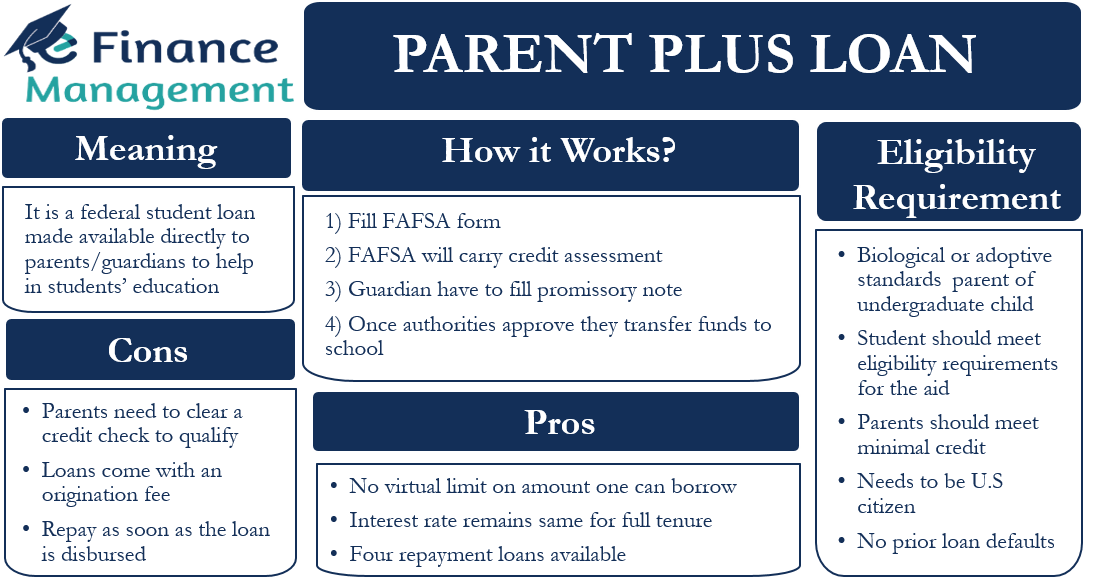
Parent PLUS Loan Repayment Terms
Since only the parent signed the Parent PLUS Loan’s master promissory note, only the parent borrower is obligated to repay the loan. Parent PLUS loans do not need to be repaid by the student. They’re under no legal obligation to do so.
If a parent has an adverse credit history, they must obtain an endorser who will agree to repay it if they don’t. However, the U.S. Department of Education states that the child on whose behalf the loan is borrowed cannot be the endorser.
Stated differently, the parent bears complete responsibility for repaying the Parent PLUS Loan, and the child cannot be coerced into taking on the loan.
Can a Parent PLUS Loan Be Transferred to a Student?
No, the U. S. The Department of Education states that a parent cannot transfer a Parent PLUS Loan to their child. A parent should not take out a Parent PLUS Loan with the goal of later transferring it to their child.
Side Agreements: A Potential Workaround
This begs the question. There are a few options available wherein the student bears some or all of the loan payment instead of the parent.
One solution is to enter into a side agreement. Here, the student consents to pay back the Parent PLUS Loan. The child voluntarily contributes all or part of the loan repayment, even though it is not legally required. To help with the expenses, they might, for example, give their parents a set sum of money every month.
- First off, the parent isn’t left to pay back a sizable loan by themselves. According to a Discover Student Loans survey, 43% of parents expressed “extreme worry” about contributing to their child’s college expenses. Side agreements lessen the financial pressure placed on parents. As a result, they can concentrate on other monetary objectives, such as retirement savings or mortgage repayment.
- Secondly, parents need not be concerned about damaging their credit record. If the student is behind on their payments, cosigning for private student loans can cause problems. Both the parent’s and the student’s credit histories may be harmed by this. Since the parent maintains control, having kids assist without formally cosigning increases the likelihood that the parent’s credit history will remain intact.
Private Student Loan Refinancing
Refinancing the Parent PLUS Loan into a private student loan is an additional choice. This effectively changes the Parent PLUS Loan’s ownership to the student, but it also results in a new loan with different terms. After that, the student must repay the new loan, and the funds from that loan are used to pay off the Parent PLUS Loan. When a child is willing and able to pay, this can significantly lessen the amount of debt that their parents have.
Only a handful of lenders currently offer this type of refinancing, including Earnest, Laurel Road and SoFi. But, other lenders might offer it as an option in the future.
Since the child will be refinancing the loan on their own without a creditworthy cosigner, the interest rates could be significantly higher than the fixed rates on a Parent PLUS Loan.
It is important for borrowers to understand that when they convert federal loans into private loans, their federal protections are forfeited. This implies that choices such as extended loan forbearances and deferments, loan forgiveness, and discharges for death or disability might no longer be available.
It can also place a financial strain on recent graduates. Refinancing a Parent PLUS loan into the child’s name will result in an increase in the child’s debt, making it more challenging for the child to get a mortgage, save money for their own small children’s college, or contribute to their retirement.
Some students believe that repaying a Parent PLUS Loan is morally required of them. But they’re by no means legally required to do so. Ultimately, the decision rests with mom and dad.
There are, nevertheless, some workarounds in which a child contributes at least some money. Making the best choice requires being aware of the various options and their advantages and disadvantages.
Follow us on Facebook, Twitter, and LinkedIn for expert advice and the latest news!
At Savingforcollege. com, our mission is to assist you in making informed decisions regarding your savings and college funding. Although some of the products in this article are from our partners, this has no bearing on our ratings. Our opinions are our own.
A good place to start:

FAQ
Does the parent have to pay the parent PLUS loan back?
It is legally your responsibility as the parent borrower to repay the loan.
Are both parents responsible for parent PLUS loan?
Having debt involved can make it even more stressful. However, the individual who signed the promissory note is accountable for the loan if you have Parent PLUS Loans.
Who is responsible for parent PLUS loan if parent dies?
The borrower’s family is not responsible for repaying the loans. If a parent passes away or the student for whom a parent obtained the loan passes away, the parent PLUS loan is discharged. Find out more about discharge due to death and the paperwork required. Was this page helpful?.
Is a parent PLUS loan a government loan?
Graduate or professional students, as well as parents of dependent undergraduate students, may apply for federal Direct PLUS Loans to assist with the cost of attending college or career school. Education costs not covered by other forms of financial aid may be partially paid for with PLUS loans.
Read More :
https://studentaid.gov/understand-aid/types/loans/plus/parent
https://www.savingforcollege.com/article/is-the-student-responsible-for-repaying-a-parent-plus-loan
